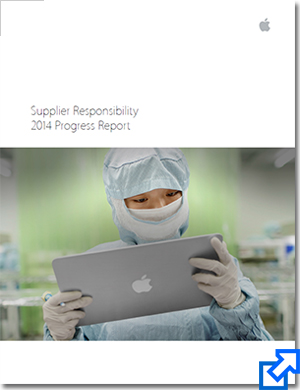Why Apple is Greenpeace’s Newest Supply Chain Hero
Apple cuts conflict minerals and puts its supplier cards on the table.
When I first started looking at Apple’s environmental performance in 2005, Apple was nearly as secretive about its environmental performance as it is about the details of the latest iPhone.
But now, just eight years later, Apple has led the industry with commitments to make its products and operations more sustainable, and progressively has been opening up vital information on its operations and supply chain.
Apple’s Suppliers Responsibility Report, released last week, is another big step away from its previous secrecy regarding its environmental performance, and another sign that Apple recognizes that its tremendous profits are directly tied to protecting human rights and a healthy planet.
Apple’s progress stems back at least to 2006, when hundreds of thousands of Apple fans told Steve Jobs “I love my Mac, I just wish it came in Green” (yes, this was the pre-iPhone era) as part of Greenpeace’s “Green My Apple” campaign. In 2007, Jobs made a rare promise, committing that Apple products would be free of the worst hazardous substances by 2009. (See the above video, Steve Jobs 2007 Keynote ‘spoof video’ - “This is the product that you, our users, asked for, and which all of us at Apple wanted to make.” - The keynote we wish Steve had made).
Apple made good on that promise, becoming the first electronics company to phase out hazardous PVC plastic and brominated flame retardants in new products, outperforming many other computer companies.
Since then, the phenomenal success of the iPhone and Apple’s growth both in size and the services it offers has vaulted the company to the top of the tech sector, with a sprawling supply chain that spans the globe. Apple and its peers no longer can afford to ignore supply chain issues involving worker safety, environmental pollution and human rights issues such as conflict minerals, but many electronic manufacturers still only provide cursory details about its suppliers.
From our experience, a lack of transparency is a pretty good indicator that a company doesn’t have a particularly good story to tell. Just as telling, big commitments to protect human rights and the environment without adequate transparency tend to be signs of a company not taking its commitments seriously.
Since Tim Cook took the helm, Apple’s increased transparency and accountability back down the supply chain significantly has improved, and is quickly becoming a hallmark of his leadership at the company.
Last week’s report, highlighting Apple’s ability to pressure its suppliers to use only smelters that can demonstrate they are free from conflict minerals, shows a growing recognition within Apple of how it can flex its considerable influence on its suppliers to deliver significant change. Along with HP’s goals for reducing the energy consumption of its supply chain and Intel’s removal of conflict minerals from its large supply chain, Apple’s part of a growing group of companies starting to address the crucial impact of making millions of devices around the world everyday.
Related: Big Companies Step Up Efforts to Trim Environmental Risks in Supply Chains
It will take truly sustainable supply chains that respect both the environment and workers, combined with new business models that don’t depend on ever-increasing consumption, if companies want to lead us toward a sustainable economy.
Apple deserves credit for being at the forefront of a small group of companies setting the pace that competitors such as Samsung must match, so the whole electronics industry can be part of a digital economy that’s better for people and the planet.
This article originally appeared on the Greenpeace blog under the title “Apple Cuts Conflict Minerals and Puts Its Supplier Cards on the Table”
Source: GreenBiz
Download the Report: State of Green Business Report 2014
All SC24/7 Coverage of “Apple”














